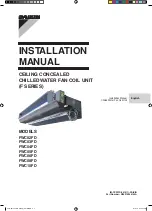
60 of 120
MVA 02 rev 5 - December 2017
6.2
Checks to be made with fan fully operating
Check that power absorption does not exceed the value indicated on the motor identification plate. If it does,
immediately halt the fan and contact the manufacturer.
Fan operation must be free from excessive vibrations and abnormal noise.
With the fan at a standstill, check that the temperature of the bearings does not exceed the limits of tolerance
(with an ambient temperature of 20°C, the temperature of supports must be no higher than 70°C). It must be
taken into consideration that in the first hours of operation, a higher temperature than that indicated may be
normal, if it then falls to a lower value. In case of abnormal overheating of bearings, consult the
FVI
technical
service.
After 3
–4 hours of operation, with the fan at a standstill and disconnected from the power supply, repeat the
checks on the tightness of nuts and bolts, bearing temperatures, and for fans with transmission, the
temperature and tension of drive belts.
On request,
FVI
fans can be fitted with vibration and/or temperature sensors for support bearings (for fans
with transmission). In this case,
FVI
installs the vibration sensor on the impeller side of the support, and the
temperature probe on the transmission side of the support.
With regard to vibrations, the criterion for the verification of conditions of safety refers to standard ISO
14694:2003, which recommends the following limits for mechanical vibrations (vibration speed in mm/s
RMS), measured in installation conditions:
alarm: 7.1 (rigid), 11.8 (flexible);
stop: 9 (rigid),
12.5 (flexible);
These limits are considered to be valid by
FVI
in general, with the exception of specific indications for
individual applications.
Measurement point and direction: on fan supports or motor, in a direction perpendicular to the rotation axis,
on the horizontal or vertical plane.
The use of the definition of rigid and flexible refers to the fact that the structure reaches its first critical speed
higher or lower respectively than operating speed.
FVI
fans normally have a rigid structure with regard to this
definition.
The type of vibration damper used affects the value of the first critical speed.
The reference limits for temperature on supports, measurable on the external bearing ring regardless of
ambient temperature, are as follows:
alarm 100 °C;
stop 120 °C;
6.2.1
Visual checks on guards
For mesh guards, checks must be made for the following:
Corrosion or dullness of galvanized surfaces
Detachment of rivets/welds
Evidence of noises typical of loose guards
Impacts and permanent deformation of components
Breakage of wires
Corrosion of fasteners
Slackening of fixing elements
















































